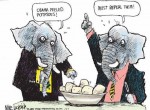Were the English really that bad to the Americans before the Revolutionary war?
The British are commonly believed to be in the wrong, but their methods (at least in my opinion) were justified.
Yes
Side Score: 1
|
 |
No
Side Score: 5
|
|
|
|
|
No, they weren't as bad as media and textbooks make them out to be. Films about the Revolutionary War like "The Patriot" make the Brits look far more heartless than they really were. They make them look like Nazis for fuck sake...burning down houses with cowering families inside, shooting people on the spot for saying something they didn't like....it's exaggerated. But just to be clear, I believe the Revolution was still necessary. Side: No
1
point
The American Revolutionary war was sustained by the principles of those congressmen who supported it. The actual "causes which impelled them to the separation" were relatively slight, and did not in themselves warrant an armed conflict. It was King George's intransigence, and advancing insanity, which caused a violent rebuke across all thirteen colonies. Jefferson said at the time "at every stage of these oppressions we have petitioned for redress... our repeated Petitions have been answered only by repeated injury." It had, by the time of the declaration, become obvious that the king would not intervene on the colonists' behalf, and would not restrain the further subversion of the liberties of Americans. It is my studied opinion, British rule had not become an absolute tyranny, and had not been terribly oppressive to the colonists. But all of the recent policies which the British Parliament had implemented, tended towards such a tyranny, and the same parliament felt no obligation to prevent it. Nor was there any apparent sympathy in the men which that parliament comprised, for the lamentations of their fellow Englishmen, nor any desire to protect and improve the rights to which they were as Englishmen naturally heir. For the reasons described above, it had become necessary, not for the repeal of foreign taxes but for the prevention of an absolute tyranny, to make a declaration of independence. The congressmen were impelled, not by revulsion at foreign dominance, but at the apathy of Parliament, the iniquitous abuse of their countrymen and their powerlessness to stop it, to exercise the measures that they did. Therefore, by the force of the arguments which I have above described, I am persuaded that the premise is false, and that the behaviour of the British to their American brethren, was not so egregious, nor intolerable, as is generally believed. Side: No
|


